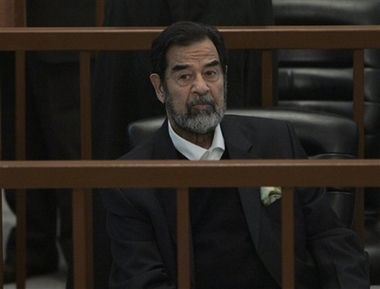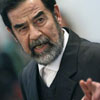Saddam trial witness recalls 40 deaths
(AP)Updated: 2006-12-04 22:38
BAGHDAD, Iraq - A Kurdish chemistry teacher testifying at Saddam Hussein's genocide trial Monday tearfully described seeing more than 40 people dead from an alleged chemical attack in 1988, including his mother and two daughters.
"My daughters died in the gassing, but my wife was still alive," Abdulla added. He said his wife survived because he gave her an antidote to which he had access.
Abdulla, 58, then turned to chief judge Mohammed Oreibi al-Khalifa.
"Your honor, you can imagine my condition when I saw my family members in this state and I'm alone in the darkness," he said. "I saw more than 40 people, most of them were women and children, lying on the ground suffering from chemical injuries."
Abdulla, who said he also was a former Kurdish guerrilla fighter, wept when he described finding the body of his mother.
"I saw a woman lying on her face near a stream and when I turned her over, I discovered she was my mother," Abdulla said. "I wanted to kiss her, but I knew I could be infected by the chemicals, so I stopped."
"I was deprived from giving her a goodbye kiss," he said, weeping.
He said that besides his mother and two daughters, 19 other relatives were either killed or disappeared following the assault.
Abdulla spoke at the resumption of Saddam's genocide trial, four days after an American forensic expert testified that an examination of hundreds of Kurdish remains found in mass graves showed they were gunned down and buried where they fell almost two decades ago.
Saddam and his six co-defendants sat quietly in the courtroom. They face the possibility of execution if convicted for a 1987-88 military offensive against the Kurds of northern Iraq.
On Nov. 5, another court convicted him in the deaths of about 150 Shiite Muslims following an assassination attempt against him in the town of Dujail in 1982. Saddam and two others were sentenced to death by hanging. Four co-defendants received lesser sentences and one was acquitted.
Michael Trimble, a forensic archaeologist with the U.S. Army Corps of Engineers, described several of the recovered bodies when he testified Thursday during the third consecutive day of testimony by U.S. forensic experts.
The prosecution estimates that 180,000 Kurds were killed in the military offensive, code-named Operation Anfal, in which Saddam's army allegedly destroyed hundreds of villages and killed or scattered their inhabitants in a scorched earth campaign against separatist guerrillas.
Trimble investigated the three mass graves in 2004 on behalf of the Iraqi tribunal prosecuting Saddam and members of his regime.
Al-Khalifa, the chief judge, approved a prosecution request Monday to wrap up hearing testimony from state witnesses during the session.
Prosecutor Munqith al-Faroon asked the court to speed up the hearing, saying "the trial should be fair and fast."
Court officials said previously "thousands" of witnesses and documents were to be processed. So far, the court has heard at least 70.
The trial abruptly adjourned until Wednesday after hearing Abdulla.
Court officials said another prosecution witness was to take the stand Monday, but the hearing adjourned after a short recess and it wasn't immediately clear why the second witness did not testify.
The next hearing will be dedicated to reviewing prosecution documents, according to court officials who spoke on condition of anonymity because they are not allowed to speak to the press.
|
||
|
||
|
|



